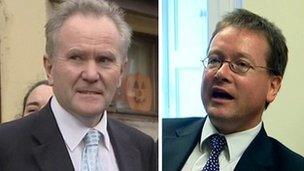Coroner John Leckey suspends inquests into controversial killings
- Published

NI's senior coroner John Leckey (l) said Mr Larkin (r) may have exceeded his powers
Families of a number of people killed in controversial circumstances during the Troubles in Northern Ireland have threatened legal action over a decision to suspend inquests into their deaths.
NI's senior coroner has suspended 14 inquests that were ordered by the NI Attorney General, John Larkin.
John Leckey said Mr Larkin may have exceeded his powers by ordering the hearings.
Mr Leckey adjourned the inquests due to potential national security concerns.
The majority of cases involve people who were killed by the Army in the 1970s, including 10 people shot dead in Ballymurphy, west Belfast in August 1971.
The suspensions were revealed at Belfast Coronors Court on Thursday morning, during a preliminary hearing into one of the 14 deaths.
'Overstretched powers'
The family of 11-year-old Francis Rowntree were in the court expecting the hearing to get under way when Mr Lecky made the annoucement.
He told the court the attorney general may have overstretched his powers and may not have had the legal authority to order the new inquests.
The coroner has referred the matter to Northern Ireland Secretary of State, Teresa Villiers, to seek clarification, as national security issues are not devolved to the assembly and remain a matter for the Northern Ireland Office.
Francis Rowntree's family said they were considering seeking a judicial review of Mr Leckey's decision to suspend the inquest.
The child was hit by a rubber bullet fired by a soldier from the Royal Anglian Regiment as he played with friends at the Divis Flats complex in April 1972. He died four days later from his injuries.
'Very upset'
The Rowntree's family solicitor, Padraig O Muirigh, said: "The decision by the attorney general in June 2012 to direct a fresh inquest was a significant step forward for the Rowntree families' quest for truth.
"The family are very upset by the decision of the coroner to suspend the inquest.
"They have waited 40 years to have a proper inquest into the death of their loved one and this development is a step backwards for them."
The other adjourned preliminary hearing due to begin on Thursday concerned the loyalist murder of Gerard Slane 24 years ago.
Mr Slane, a 27-year-old father of three, was shot dead by the loyalist Ulster Defence Association (UDA) at his home at Waterville Street, west Belfast, in September 1988.
His murder led to allegations of collusion between loyalist paramilitaries and the security forces.
Judicial review
Lawyers acting for Mr Slane's widow are to take legal action in an attempt to force the coroner to hold the inquest.
In a statement, the Ballymurphy families also said they were "very upset" by the decision to suspend fresh inquests into their loved ones' deaths.
They said: "This decision was made without the knowledge or consultation with the families".
They added they were also considering a judicial review of Mr Leckey's decision.
The Ballymuphy shootings happened over a 3-day period in August 1971 following the introduction of internment.
A Catholic priest and a mother of eight were among those shot dead by the Parachute Regiment.
- Published15 November 2011
- Published9 June 2010